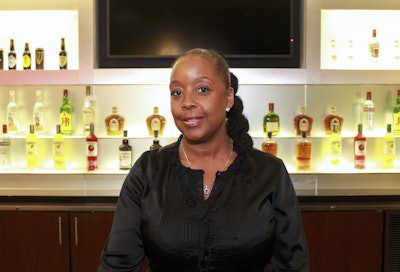To address student loan debt inequities, Diageo North America — a beverage company popularly known for Smirnoff vodka, Guinness beer and Crown Royal whiskey, among other brands — has donated $10 million to 25 historically Black colleges and universities (HBCU) across the country.
Despite the lower cost of attendance, students who graduate from HBCUs hold higher loan debt compared to those who attended non-HBCUs, according to the United Negro College Fund (UNCF).
 Danielle Robinson
Danielle RobinsonWhile Black bachelor’s degree graduates borrow an average of $52,726, their White counterparts have an average of $28,006 in student loans, the United States Department of Education reported. That means Black college graduates typically experience $25,000 more in student loan debt.
“Not only are [Black and Brown communities] starting at a lower base salary in many cases, but they also have debt,” said Danielle Robinson, head of corporate responsibility at Diageo North America. “They never really catch up to be on a level playing field with their White colleagues. Part of this effort is to help alleviate some of that financial debt as they enter the workforce and enable them to be more on parity with their White colleagues.”
Each institution can use the funding to establish permanent endowment funds, while some of the money can provide financial aid support to students in various disciplines this spring and fall semester.
The selected HBCUs include Alabama A&M University, Alabama State University, Bowie State University, Clark Atlanta University, Delaware State University, Dillard University, Fisk University, Fort Valley State University, Florida A&M University, Grambling State University, Hampton University, Harris-Stowe State University, Howard University, Jackson State University, Kentucky State University, Morehouse College, Morgan State University, Norfolk State University, North Carolina A&T University, North Carolina Central University, Tennessee State University, Tuskegee University, University of Virgin Islands, Winston-Salem State University and Xavier University.
“The cost of college attendance is a major source of stress for many students …,” said Daryl Love, associate vice president of career services and professional development at Kentucky State University. “When students know they have the funds to achieve their dreams, they are more likely to continue on to graduation and they are willing to take on additional opportunities such as internships that will enhance their career readiness upon graduation.”
As part of the company’s $20 million Community Fund effort, the donation was established alongside the work of Diageo North America’s African Heritage Business Resource Group (A.H.E.A.D.).
 Daryl Love
Daryl Love“I am very proud to work for a company that recognizes the need for corporations to step up in helping to provide solutions to some of the disparities in our communities and our society,” said Robinson. “It is about being a part of helping to close the wealth gap of students coming from higher education into corporate America.”
Since their inception, HBCUs have been working to confront the wealth gap. But they “can’t do it alone,” she added.
Marc A. Newman, vice president of advancement, research and economic development at Grambling State University, emphasized the need for higher education to become a priority in legislative conversations.
“The ultimate goal of higher education is the leveling of the playing field and the creation of opportunity,” he said. “Financial support allows students to graduate and immediately start to grow their personal financial portfolios.”
In recent months, policymakers have looked to address the national student debt crisis. President Joe Biden recently announced a proposal to make four-year institutions free for those with a household income of up to $125,000 per year as well as free access to community colleges.
With the intention of increasing the number of underrepresented populations within the beverage industry, the funding will also establish an internship platform, in which HBCU students can receive first-hand work experience within the industry.
Additionally, Diageo will help create innovation hubs for students to participate in hands-on learning and mentorship with industry professionals. Curriculum development will also be available for faculty members.
“We are very excited about the innovation hubs,” said Robinson. “We get to create them, customize them. [They’re] really fashioned behind what has been done for years at predominantly White institutions but now at HBCUs. It is very groundbreaking work that we are looking forward to.”
Beyond this recent endowment, Diageo North America has implemented a number of programs over the years to diversify the beverage pipeline. In 2015, Diageo established the four-week Learning Skills for Life program to improve job opportunities in areas of high adult unemployment rates, especially among veterans and underrepresented populations.
“I really just encourage other corporations to step up,” said Robinson. “The world has changed and we really need to include all segments of our society, especially our HBCUs because they are the foundation of the Black culture as far as education. If we are going to wrap our arms around that community, I think we all need to play a part in that.”
Sarah Wood can be reached at [email protected].


















